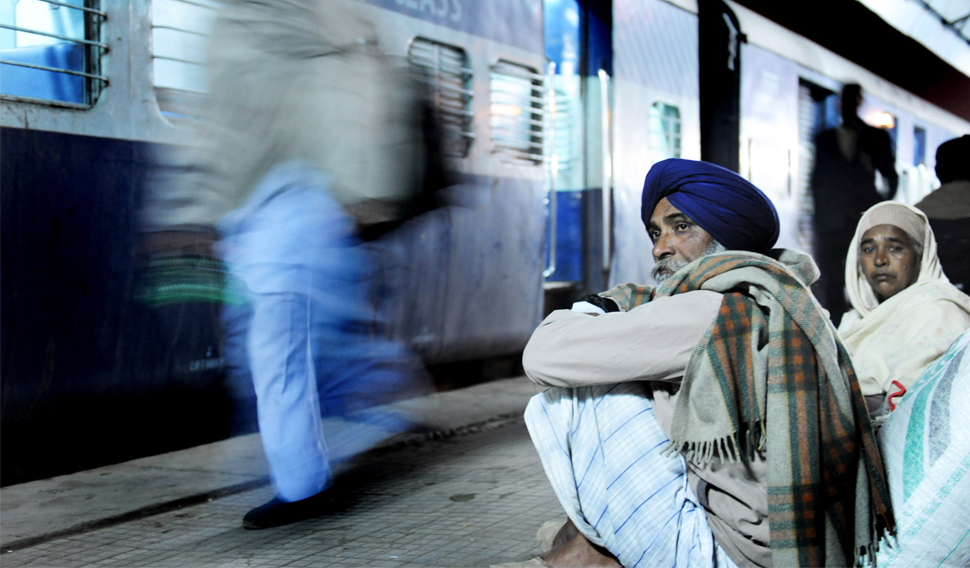
Train 339, a lifeline
These cancer patients' journey of hope for treatment is a grim reminder of the Malwa region’s bane
Aayush Goel

Journey of hope: The overnight journey from Bathinda to Bikaner on board Train 339 is a weekly ritual for Mandar Singh and his wife Amarjeet Kaur. She is being treated for nasal cancer at the Acharya Tulsi Regional Cancer Treatment and Research Institute in Bikaner. Here, he waits at Bathinda station with a relative for the train to arrive. Says Mandar, about the journey that hundreds of cancer patients make on the train, “We all may be different from each other but are joined by the common thread of misery.”

Masked pain: Mandar Singh’s wife Amarjeet Kaur has nasal cancer. She and her husband have worked out a drill to get aboard the train. As soon as the train stops at Bathinda, she would rush in to grab a seat while he would get the tickets and dinner. For most of the passengers onboard Train 339, it is a journey of hope and pain. They have given the iron horse a name, too. They call it the Cancer Train.

Cruel irony: As screening facilities are inadequate in government hospitals, most cancer patients have no option but to go to quacks. Says Jaspreet, 16, who is suffering from leukaemia: “I had decided to take up the medical stream in class XI so that I can be a cancer specialist one day to help my people.” Ironically, when Jaspreet fell ill, her father, Malkeet, took her to a quack; he thought taking her to Bikaner would affect her studies.

Worth the ride: Swaran Singh, 48, comes from Ludhiana, where he works as an industrial labourer, to catch the Cancer Train at Bathinda. He is undergoing treatment for throat cancer at Bikaner. “This train is my lifeline,” he says. “This is the journey of my life.” Train 339 starts her journey from Abohar in Punjab every evening at 7.40 p.m. After largely uneventful stops at Pakki, Malout and Gidderbaha, she reaches Bathinda at 9 p.m., where hundreds of cancer patients like Swaran and their relatives would be waiting.

Here to help: “I will not comment on the health machinery of any state, but it’s true that majority of our patients come from the Malwa region of Punjab,” says DR. M.R. BARDIA (second from right), director of the Acharya Tulsi Regional Cancer Treatment and Research Institute. “Most of them are in secondary and tertiary stages of the disease hinting at non or poor diagnosis at initial stages. We are able to save many lives but unfortunately are yet to ascertain the reason behind the deadly disease.”

In search of succour: Patients wait for their turn at the Acharya Tulsi Regional Cancer Treatment and Research Institute, Bikaner. According to government figures, cancer on an average has claimed 300 lives a year in the Malwa region since 2008. The offi cial website of the Punjab health department says some districts have as many as 78 cancer patients per lakh of the population.

Jinxed: Everyone knows the kaani (one-eyed) family. “The disease which tiptoed into my family 15 years ago has snatched away everything, including our family name. We are now known as the one-eyed ones,” says Darshan Singh, father of two and a half-year-old Inderveer, who has cancer in her right eye. Her cousin Amandeep, 12, also had the same problem, but luckily all is well after her eye transplant.

Toxi’city’: Says Umendra Dutt, director of Kheti Virasat Mission: “Farmers are caught in a cesspool of toxicity, a result of excessive and unregulated use of pesticides and chemical fertilisers, which have contaminated the groundwater.”

Lonely tomorrow: The train has not made any difference to the life of Lakhwinder Singh. He is 24 and has been to Bikaner. “My doctors have barred me from getting married. Nor can I do any work in the field,” he says. Cancer has claimed both his testicles.

The rail to remedy: Train 339 from Abohar to Jodhpur arrives at Bathinda railway station. Many resign to the illness because sustained treatment would require travelling to centres outside the state. Not to mention the cost of the treatment, which is unaffordable for many.